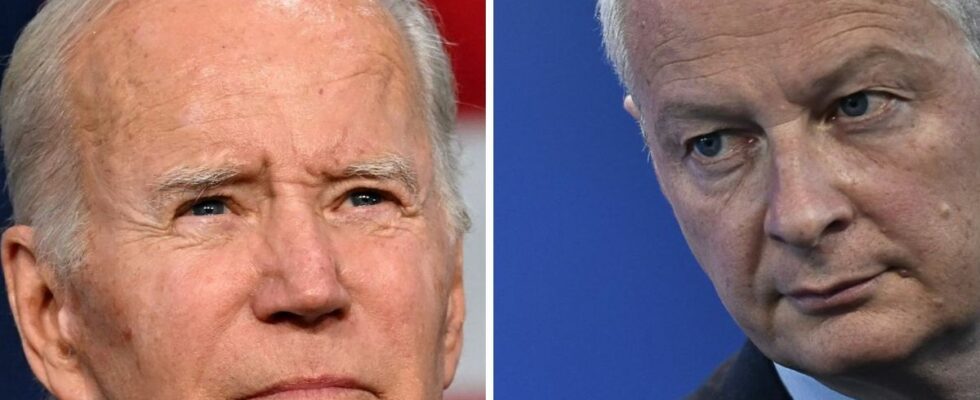The massive subsidies of the United States to their economy are “contrary to all the rules of international trade” and call for a “coordinated, united and strong” response from Europeans, said the Minister of Finance, Bruno Le Maire, in a published interview. by four European newspapers, The echoes, Handelsblatyou, El Mundo and Corriere della Sera. 20 minutes takes stock of this new flavor of trade conflict over the Atlantic.
But what are these massive American subsidies?
These are massive subsidies granted by the United States to companies on its soil. “In some cases, the amount of subsidies that the Biden administration offers is four to ten times the maximum amount authorized by the European Commission”, denounced Bruno Le Maire, this Monday. By evoking “this certain case”, the French Minister of the Economy refers to the American law on the reduction of inflation, the “Inflation Reduction Act” (IRA), so named to stick to current events, but which is, in fact, a program of environmental and social reforms. The IRA is the biggest investment ever made in the fight against climate change, providing $370 billion for the construction of wind turbines, solar panels and electric vehicles. The plan notably provides for a tax credit, up to $7,500, reserved for the acquisition of an electric vehicle coming out of a North American factory with a locally manufactured battery, thus excluding automobiles produced in the European Union. .
Why is this a problem (for Bruno Le Maire)?
Europe denounces exceptional aid contrary to the rules of international trade and an IRA of several hundreds of billions of dollars of investments which could seduce a number of European companies. The subject is all the more worrying as recession threatens to hit the continent this winter due to the economic consequences of the war in Ukraine. European firms are already penalized by soaring energy prices, which hits them much harder than their American competitors. As a result, “some large foreign companies that wanted to set up in Europe are now hesitating between European sites and American sites,” said the French Minister of the Economy. According to him, “in France, the first estimates indicate that ten billion investments and thousands of industrial jobs are at stake”.
“Historical irritants are barely appeased when Washington adopts very offensive measures,” comments Elvire Fabry, trade geopolitics expert at the European Jacques Delors Institute. Politically, however, the latter sees more in the measures of the Biden administration “a domestic agenda to protect American interests” than a “declared tariff war” as under the Trump era.
What are European leaders (including Bruno Le Maire) saying?
“We expect the European Commission to make proposals for a strong response to this American policy,” French Finance Minister Bruno Le Maire said in Brussels, before a meeting with his counterparts from the 27 which is to address the subject tomorrow. tuesday. “The way forward is to seek dialogue with the American administration in order to find common solutions,” pleaded the German Christian Lindner. “I am not sure that the American side has yet fully realized the extent of our concerns,” he said, saying he wanted to “do everything to avoid a trade war”.
For his part, the European Commissioner for the Internal Market, Thierry Breton, was very firm during an interview with BFM Business. “We will obviously consider retaliatory measures”, he launched, waving the possibility of going “before the WTO” (the World Trade Organization) to put forward the European arguments if no outcome was found amicably.
When did the tensions start (according to Bruno Le Maire)?
At the origin of the rise in tensions between the two great Western powers, the establishment this summer of the “Inflation Reduction Act”. However, the risk of a “trade war” between the two allied regions has been raised openly in recent weeks. Bruno Le Maire thus used the expression during a visit to Berlin in October, while calling for it to be avoided, and German Chancellor Olaf Scholz spoke of the risk of a “huge tariff war”.
It is good to know that the trade war is not new in relations between the United States and the European Union, which have had to settle several disputes in recent years. Among them, the face-to-face between the European aeronautics giant Airbus and the American Boeing, again against a background of subsidies, and the imposition of additional customs tariffs, by the Trump administration, on the steel and aluminum.

